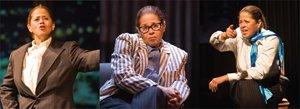Let Me Down Easy (4/28/2009)

If you're squeamish, like I am, on the topics of death, dying, and illness, you shouldn't let that stop you from experiencing Anna Deavere Smith's Let Me Down Easy. However, you might not want to see it during a global health scare. On April 28, one of the first days of the swine flu panic, Smith's documentary production, in which she single-handedly portrays a slew of people who face death in some way, resonated a bit too robustly.
Austin's Zach Theatre is the show's last regional stop before Broadway, and, according dramaturg Gideon Lester, Smith has reshaped and refocused her masses of material—monologues gleaned from interviews she conducted with hundreds of people—since the play's 2008 opening in New Haven. In Austin, Smith began with energy and humor, portraying choreographer Elizabeth Streb as she re-enacted a flubbed dance effect in which she accidentally set herself on fire.
Next, Smith became cyclist Lance Armstrong, slouching on a sofa and discussing his bought with cancer and his competitive streak, as well as his lack of familiarity with her genre: "I gotta tell ya, I never seen a play, for starters." This kind of hilarious, self-conscious meta-commentary came up again in a couple of interludes in which Smith portrayed New Yorker theatre critic John Lahr grappling with the concept for the play.
After a series of characters whose claim to the "death" theme is that they willingly put themselves in danger of it—rodeo bull rider, boxer—Smith turned to the topics of illness, being a patient, and health care. It was at this point that Smith seemed to disappear, her physical presence taking a backseat to the language and manner of the material. A sixteen year-old girl with leukemia discussed her illness alongside her mother, who groped her memory in an attempt to pinpoint exactly when something went wrong. A monologue in the character of Philip Pizzo, the dean of the Stanford University School of Medicine, got a forceful round of applause after he identified the U.S. health care system as "broken" and in desperate need of a change from market-driven to government run.
The voice with the greatest clarity, for me, was Kiersta Kurtz-Burke, a physician at Charity Hospital in New Orleans, a public hospital where nurses and doctors cared for patients without electricity, relief, or adequate food for nearly a week post-Katrina, even after private hospitals had been evacuated. As Kurtz-Burke, Smith explained the realization, from the perspective of a "privileged" person, that the patients knew long before she did that their government would not make rescuing them a priority. "That was the first time in my life I've ever been abandoned by my government," she said. But for the low-income patients, those who have been given "the shit end of the stick" their whole lives, the neglect wasn't a surprise. Wham.
Smith ended the play with treatments of death itself. As a Brahmin-accented reverend, she discussed the important of closure for the living: "I insist that you see the box go down into the ground." As Trudy Howell, an orphanage director in Johannesburg, she explained the heart-wrenchingly practical process of helping children with AIDS accept their own deaths. To end the play, Smith became a Tibetan monk with a swift image: the just-dead as a cup of tea turned upside down. The liquid poured out. Silence ensued. The lights went out. Fin.